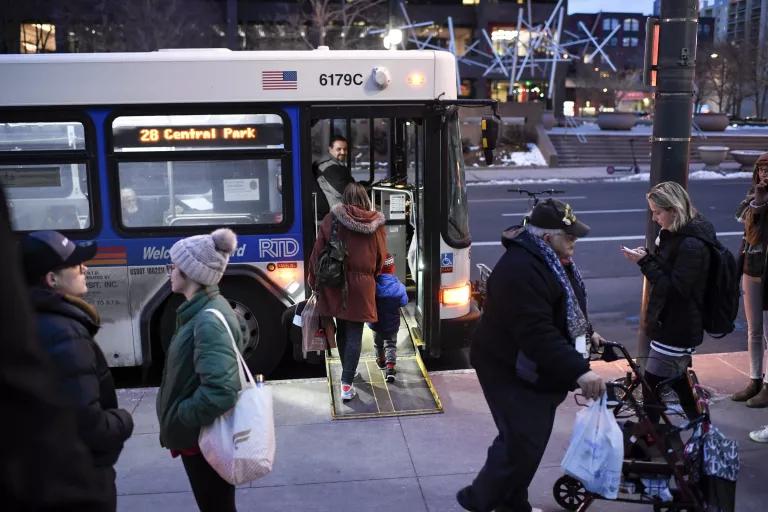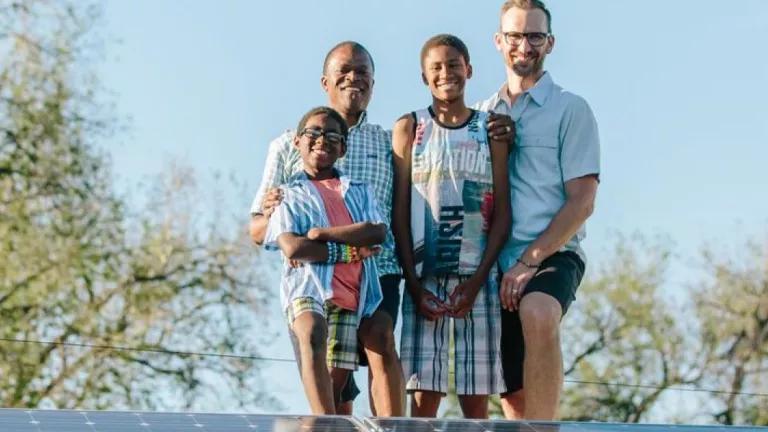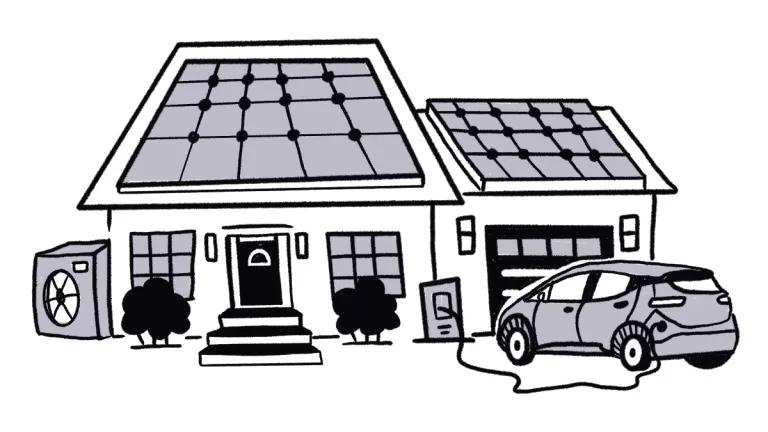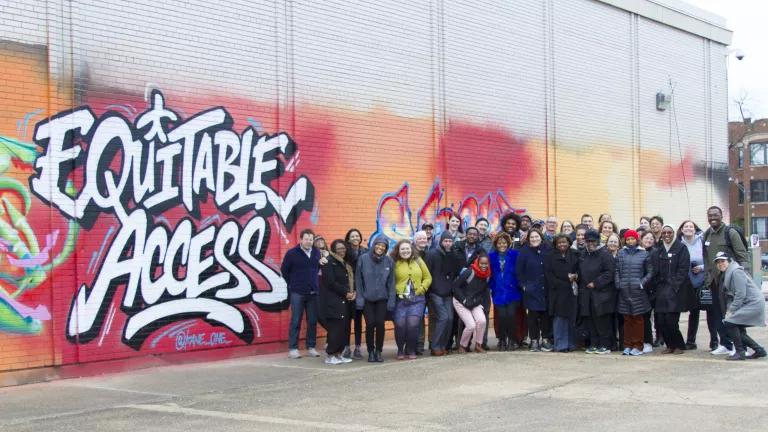Moving Forward on Equitable and Sustainable Mobility in 2020
City and community leaders across the nation have rallied over the last 12 months to advance policies that both tackle climate change and help catalyze a just recovery from the global pandemic.

To commemorate the end of this challenging year, I share this reflection from one of my colleagues, Alfonso Directo Jr.
Despite being an incredibly tough year full of intersecting crises, city and community leaders across the nation have rallied over the last 12 months to advance policies that both tackle climate change and help catalyze a just recovery from the global pandemic.
Over two years ago, the Bloomberg Philanthropies American Cities Climate Challenge began to help 25 cities set and surpass ambitious climate goals by ramping up action in the two highest-emitting sectors in cities: transportation and buildings. This year, as Climate Challenge staff adapted to a challenging year alongside city staff and everyone else, Climate Challenge teams sought to catalyze actions for lasting equitable and sustainable change.
Uplifting historically disinvested communities
Against the backdrop of the devastating health and economic impacts of COVID-19 on communities of color and the national reckoning on race, many Climate Challenge cities this year began shifting systems of influence to become more deliberately inclusive of communities, which are the fabric of our nation. The Climate Challenge helped to uplift the perspectives from historically underserved and underinvested communities through advocacy and equitable policymaking this year in a variety of ways, including the following:
- Washington D.C. - Local advocates launched the DC Transportation Equity Network this year, in response to the need for more community input as the city considers congestion pricing policies. Climate Challenge staff and advocates have raised community voices on various transportation equity issues.
- Philadelphia - Transit Forward Philly, an equitable transit advocacy group that launched this year with Climate Challenge support, successfully won free transit for youth on SEPTA, the regional transit system and supported the build out of bus-only lanes.
- San Diego - San Diego officials adopted the Mobility Choices ordinance this fall to invest more funding for safe walking and biking in traditionally disinvested communities. Climate Challenge staff worked with the city and local equity stakeholders crafting a policy that connects mobility needs with sustainable development.
- St. Louis - St. Louis secured federal funding to help low-income seniors overcome barriers to using electric vehicles.
Organizing street space for people
Public space and local streets became a nationwide focus this year as residents with the privilege to shelter in place adapted to government orders to stay home to slow coronavirus transmission. In the early days of the pandemic, when it became clear that people wanted more safe spaces to walk and bike both to get around their communities and also for exercise and recreation, many cities started to create slow streets and shared streets programs so people of many ages and abilities could experience their local streets with fewer cars. The results have been overwhelmingly popular. Many cities also reclaimed street space for bus riders, many of whom are frontline workers and people of color, who have had no choice but to leave home to go to work throughout this pandemic and whose families have borne the worst effects of the pandemic. The Climate Challenge helped cities reclaim street space for their residents in the following places and ways.
- Dedicated Bus Lanes - Cities rolled out the red “carpet” (paint) or otherwise dedicated lanes to give buses riders travel priority with projects including Portland’s Rose Lanes, Honolulu’s TheBus, and Downtown Los Angeles’s Bus and Bike Lanes.
- Bike Lanes - Cities reclaimed street space for people riding bikes with green paint. San José led the pack with 400 miles of bike lanes and more on the way!
- Slow Streets - Dozens of cities transformed their local streets into safer places to walk and bike. Seattle was an early adopter, and officials have taken the next step to make 20 miles of slow streets permanent!
Catalyzing long-term climate investments
In a national election year when the stakes of democracy were already high, voters in at least four Climate Challenge cities passed ballot measures to invest in climate action, three of which fund transportation investments. Separately, city officials took action behind their virtual daises this year to plan for a future with electrical vehicles. In these cities, officials passed EV readiness ordinances to lay out their cities’ plans to develop electric vehicle-serving infrastructure and to ensure vehicle access for their most vulnerable residents.
The Climate Challenge supported the following three cities with ballot measures that include transportation investments.
- Cincinnati - Passed by Cincinnati voters in the spring, Issue 7 invests sales tax revenue to fund transit service that runs more often and for more hours of the day.
- Denver - Passed by Denver voters in the fall, Measure 2A invests sales tax revenue to fund climate action programs, including ones that expand and enhance low-carbon transportation options such as in walking, biking and neighborhood-scale transit service.
- San Antonio - Passed with support from more than two in three San Antonio voters this fall, Proposition A will redirect a portion of existing sales tax revenue to enhance bus service and transit connectivity with other modes of transportation.
The Climate Challenge supported officials in the following three cities with shaping and adopting plans for providing equitable access to electric vehicles.
- Boston - Boston adopted its EV Ready Policy & Roadmap, which will ensure every home is within a ten minute walk of a public charger or EV Car share facility.
- St. Louis - St. Louis is quickly emerging as an EV leader in the Midwest, having secured funds for an electric mobility equity pilot project to provide meal delivery and medical appointment trips to low income seniors earlier this year, and passing an EV readiness ordinance out of committee this December.
- Saint Paul - Saint Paul is on the pathway to launching one of the largest electric vehicle carshare and public charging systems in the country with its innovative Twin Cities Electric Vehicle Mobility Network. Saint Paul secured $6.7 million in US DOE funding to build 70 charging hubs across the Twin Cities, implemented an innovative community design process, and launched a request for proposals to procure EV charging infrastructure.

Taken together, these city wins and milestones represent a remarkable body of work. And, there's more work to be done. As 2020 closes and we welcome a new year, we must further a worldview that’s more resilient and equitable. A just recovery from this pandemic includes adapting transportation policy-making further to respond to our community’s intersectional demands, which include ending the coronavirus pandemic, police brutality, housing instability, and economic insecurity. In 2021, the Climate Challenge team is doubling down on a sustainable and equitable future and is eager to keep working with cities and communities to cut carbon emissions, center underserved voices, and deliver benefits with and for underserved communities. We wholeheartedly continue this journey together.



